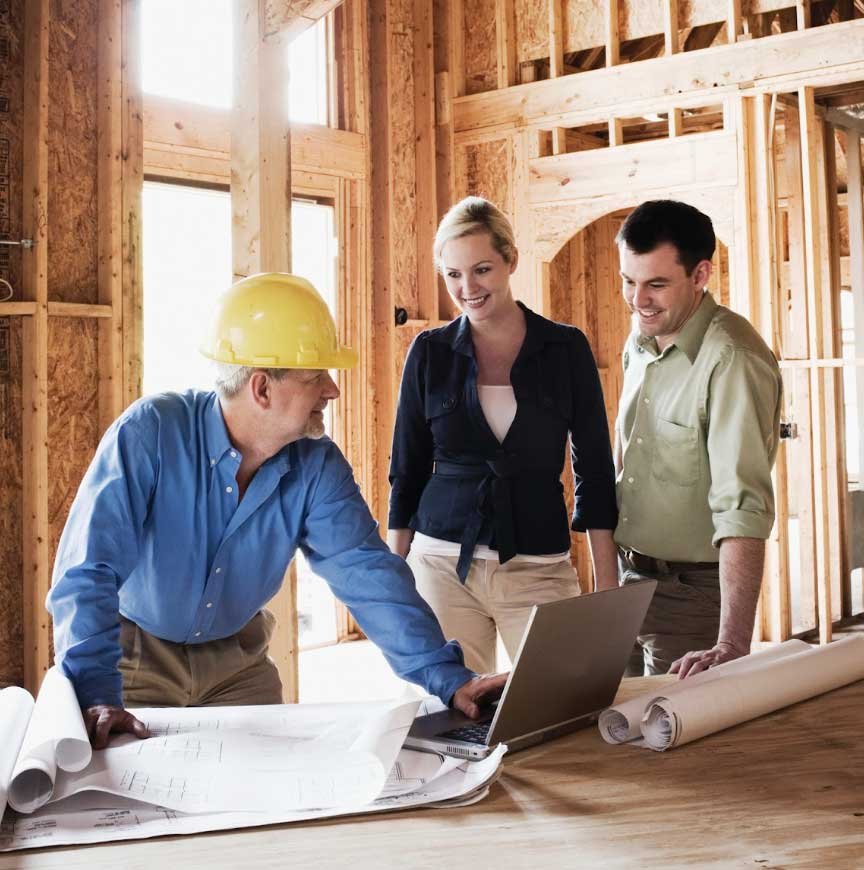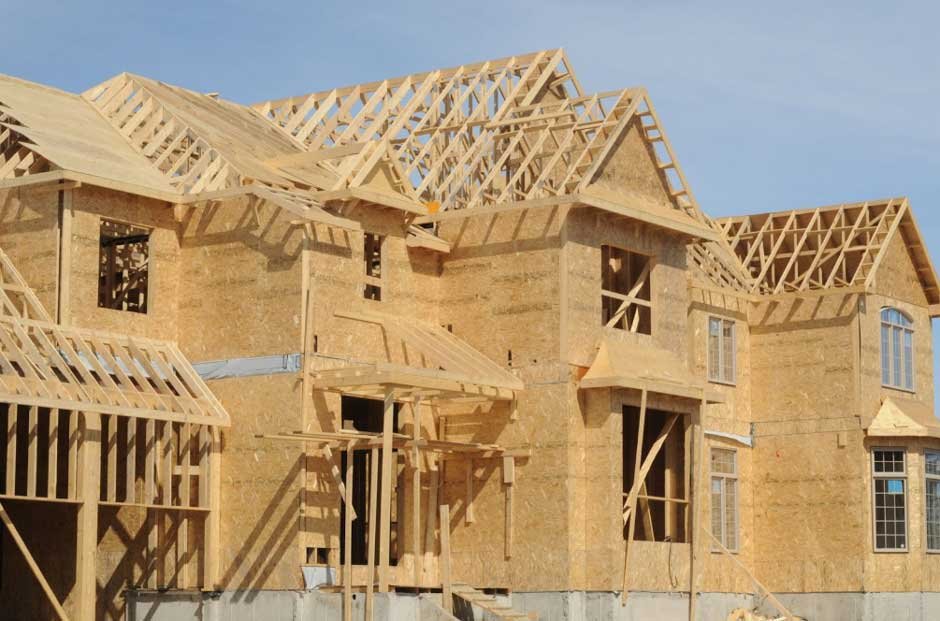Skip to the good bit
ToggleCalgary, Alberta, Canada. Jan 18, 2025. A row of new homes is under construction, and their wooden frames and yellow insulation are visible against a cloudy sky.
What should you expect to pay for your dream home in Calgary? Navigating the costs of building a custom residence can be an exciting challenge filled with variables like land prices, materials costs, and construction loans. Whether you are aiming for a sleek, modern look with high-end electrical fixtures or cozy finishes in a single-family home, understanding the overall cost per square foot is essential. Discover how an experienced contractor can help you manage your new home build while ensuring the home-building process stays on budget and meets local authority requirements!
Table of Contents
What Do Custom Home Builders Charge in Calgary
Selecting the Ideal Custom Home Builder
The Real Cost of Custom Home Construction
- Securing Construction Loans
- Understanding Custom Home Costs
- Land Purchases and Prices
- Site Preparation
- Construction Costs
- Material Costs
- Roofing Materials
- Exterior Finishes
- Windows and Doors
- Interior Materials
- Plumbing and Electrical Fixtures
- Soft Costs
Your Dream Home Awaits
Selecting the Ideal Custom Home Builder

A young couple is meeting with their homebuilder at the construction site, looking over blueprints.
Choosing the right custom home builders in Calgary is essential, as it influences the design, functionality, project timelines, and costs of your custom-built home. A reliable builder ensures efficient execution of each phase of the home building process, helping with planning while minimizing delays and complications. In contrast, an unreliable builder can cause unforeseen issues that inflate costs and extend timelines.
Experience and Reputation: Look for builders with a proven track record in constructing custom homes.
- Quality of Materials: Ensure they use high-quality materials that comply with local inspection standards.
- Cost Management: Discuss how they handle construction costs to avoid significant overruns.
- Communication: Choose builders who maintain open lines of communication throughout the project.
- Past Projects: Review their portfolio to see completed projects that align with your vision for your luxury custom home.
The Real Cost of Custom Home Construction
Ever wonder where every dollar goes when building a home? Understanding costs—from land purchases to finishing touches—will help you create an effective plan to achieve your dream home without overspending. Stay aware of potential expenses like permit fees and material upgrades, and collaborate with experienced builders for detailed estimates to keep your budget in check.
1.Securing Construction Loans
Most construction loans provide financing for your custom home project, covering expenses such as land purchases, materials, and labour. These loans are especially popular for those building their single-family home and differ from traditional mortgages in that they release funds in stages throughout the construction process. Accurate cost estimation and careful project planning are imperative for managing budgets effectively and ensuring the project stays on track. Partnering with experienced contractors can simplify navigating construction loan complexities, helping you manage the cost to build your new custom home efficiently with a transparent estimate while adhering to local permit requirements.
2.Understanding Custom Home Costs
The excitement of seeing your luxury home materialize can quickly turn to concern if costs spiral beyond what you envisioned. The average cost for building a standard custom home ranges from $250 to $300 per square foot. For those opting for a luxury custom home, this figure can escalate beyond $400 per square foot, particularly when high-end materials and unique designs are involved. Knowing the potential expenses involved helps you prepare for each step of the home-building process.
3.Land Purchases and Prices
One of your first major expenses will be purchasing land. Land prices can vary dramatically based on several factors, including location, size, and zoning regulations. Urban areas typically see higher prices compared to rural regions. For example, the average cost for residential land in urban Calgary can range from $30 to $200+ per square foot, whereas in rural areas, land prices may be available for as little as $1 to $20 per square foot. The size of your chosen lot is a major factor in determining land acquisition expenses. Bigger plots tend to have higher costs, while smaller ones offer more affordable options. Understanding the costs associated with land purchases allows for better overall budget planning.
4.Site Preparation
Before you can even lay the foundation, considerable work may be needed to prepare the site:
- Clearing and Grading: You can expect to invest between $1,500 and $5,000 in site preparation tasks, such as clearing trees, rocks, and vegetation. Grading the lot to ensure proper drainage and a level foundation can add another $1,000 to $3,000 to your costs.
- Utility Connections: Connecting your new home to municipal services can also prove costly. Depending on the distance from existing utility lines, this can cost between $10,000 and $30,000, especially in rural areas where distances may be greater.
5.Construction Costs

Construction of a new home is underway. The house is in the initial stages, with framing and no roof.
Once the land is prepared, the construction begins, which encompasses the bulk of your total construction cost:
- Foundation: The type of foundation—slab-on-grade or full basement—will significantly impact costs. Depending on the complexity of the design and local soil conditions, a typical foundation could cost between $10,000 and $30,000.
- Framing: Framing the house, which is essentially building the skeleton of the home, can cost about $15 to $30 per square foot. For a 2,000-square-foot home, the costs per square footage can add up quickly to $30,000 to $60,000.
6.Material Costs
The cost of materials significantly impacts the overall expense and appearance of your custom home project. Premium materials in your home design, such as high-end cabinetry, flooring, or unique electrical fixtures, boost beauty and value, but each adds to the finishing costs. To effectively manage your budget for your dream home, it’s essential to carefully consider how these elements will affect the overall cost of construction.
7.Roofing Materials
The roof shields your home from the elements, so it’s paramount to choose appropriate materials that fit your budget. Options such as asphalt shingles, metal roofing, or tile have different price points. For instance, metal roofing may cost $10,000 to $15,000, while asphalt could range from $5,000 to $12,000. Investing in durable roofing materials protects your investment and minimizes repair costs later.
8.Exterior Finishes
First impressions matter, and the exterior of your home is no exception. The materials you choose for siding, brick, or stone will affect the overall aesthetic and energy efficiency. Budgeting around $15,000 to $40,000 for quality siding options ensures a beautiful and functional facade. Choosing the right finish also adds value to your custom home, appealing to both your style and potential future buyers.
9.Windows and Doors
Quality windows and doors not only add beauty but also improve energy efficiency. Costs for installing exterior doors and windows can vary significantly based on style and material. The average price for quality windows can range between $10,000 and $20,000 here. Energy-efficient models may have a higher upfront cost, but they lead to significant savings on heating and cooling down the line.
10.Interior Materials
Interior material choices, from flooring to cabinetry, can make or break your home’s ambiance. Quality flooring (hardwood, tile, or carpet) may cost around $15,000 to $30,000, while kitchen cabinetry and countertops can cost between $20,000 and $50,000. The delicate interplay of finishes throughout the home contributes to a cohesive look that resonates with your style.
11.Plumbing and Electrical Fixtures
When building a custom home, it is important to select high-quality plumbing and electrical fixtures. The costs for plumbing materials, including piping and fixtures, can typically range from $5,000 to $15,000, depending on the complexity of the system. Similarly, electrical fixtures such as lighting, outlets, and wiring may run between $7,000 and $20,000. These costs can fluctuate significantly depending on your preferences for brands and styles.
12.Soft Costs
Beyond the actual construction process, soft costs cover various other expenses involved in building your home. These may include fees for necessary permits, services for design and planning, and any related expenditures. It’s important to note that these costs typically range from $200 to $250 per square foot, so it’s crucial to plan and budget accordingly carefully. Additionally, obtaining necessary documents, such as a plumbing permit and permits for electrical work, requires careful attention to ensure compliance with regulations before any actual work can commence.
Your Dream Home Awaits
Building a house is a significant undertaking. Ensuring you are equipped with the right information is key to making informed decisions throughout the journey. By understanding cost factors and taking the time to plan your initial design carefully, you can navigate the complexities of this process with confidence. Finding the right builder—someone who resonates with your vision and understands your needs—will create a beautiful partnership that leads to the successful completion of your custom home. As you seek estimates and embark on this exciting adventure, remember that every step you take brings you closer to the home you’ve always imagined.







